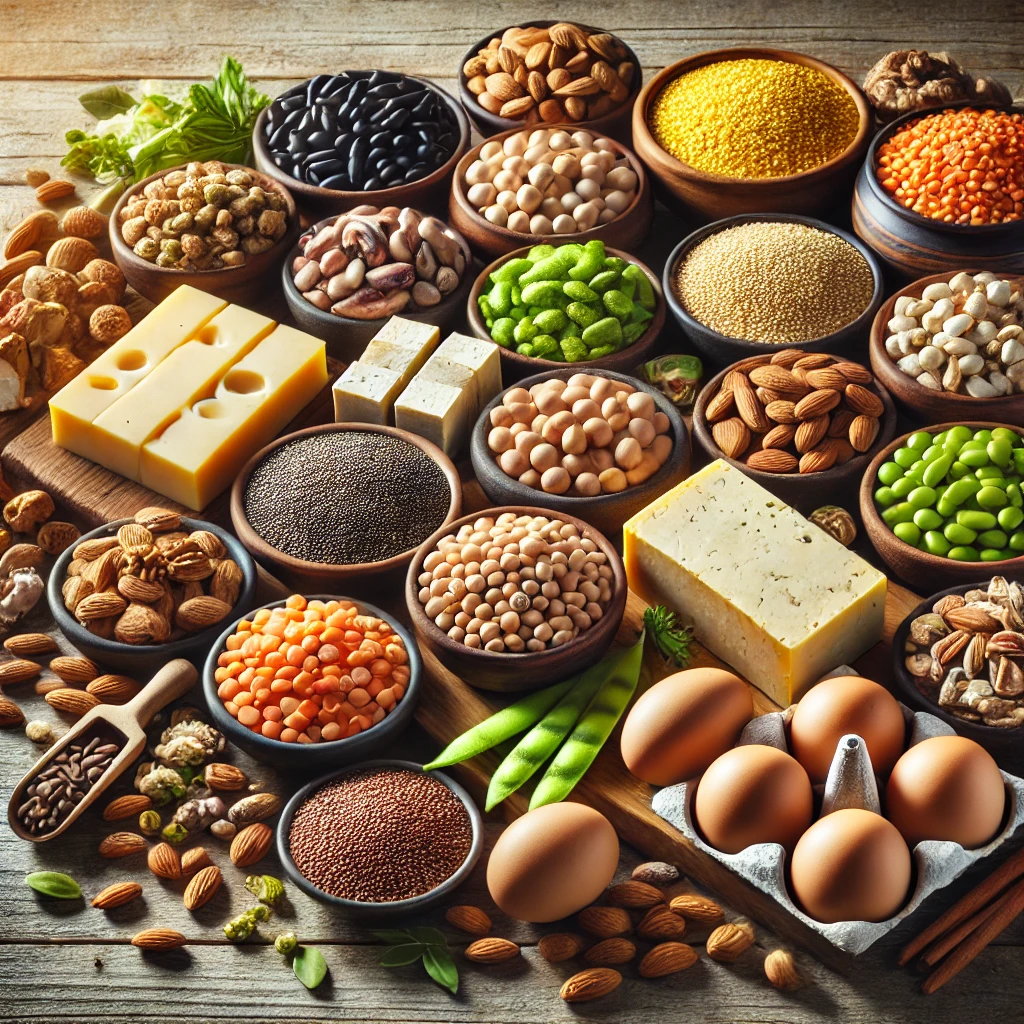Proteins are vital macronutrients that play a fundamental role in building and repairing tissues, producing enzymes and hormones, and supporting immune function. As the body’s building blocks, proteins are essential for growth, muscle development, and maintaining overall health. Understanding the functions of protein and the best dietary sources can help you meet your nutritional needs.
Functions of Proteins
Building and Repairing Tissues: Proteins are the building blocks of muscles, organs, skin, and other tissues. They are necessary for growth and tissue repair, especially after injury or exercise.
Enzyme Production: Many enzymes, which catalyze biochemical reactions in the body (such as digestion and metabolism), are made of proteins.
Hormone Production: Proteins are involved in producing hormones, which regulate various physiological processes. For example, insulin, a protein hormone, helps regulate blood sugar levels.
Immune Function: Antibodies, which are proteins, play a crucial role in the immune system by identifying and neutralizing harmful pathogens like bacteria and viruses.
Transport and Storage: Proteins like hemoglobin transport oxygen in the blood, while others store vital nutrients, such as iron, for later use.
Supporting Cell Structure: Proteins provide structural support to cells and tissues, ensuring their integrity and function. For instance, collagen, a protein, is a key structural component in connective tissues like skin, tendons, and ligaments.
Maintaining Fluid Balance: Proteins help regulate fluid balance within cells and tissues, ensuring that cells are neither too swollen nor dehydrated.
Sources of Protein
Protein can be obtained from a variety of food sources, both animal-based and plant-based.
Plant-Based Protein Sources
- Whole Grains: Quinoa, farro, barley, and oats contain moderate amounts of protein and are often rich in fiber, making them an excellent addition to a balanced diet.
- Nuts and Seeds: Almonds, peanuts, chia seeds, and sunflower seeds provide a good amount of protein along with healthy fats.
- Vegetables: Certain vegetables, like broccoli, spinach, and Brussels sprouts, contain smaller amounts of protein but can contribute to overall protein intake when included in meals.
- Legumes: Beans, lentils, chickpeas, and peas are excellent plant-based sources of protein, often high in fiber and other nutrients.
- Tofu and Tempeh: These soy-based products are rich in protein and can be used in a variety of dishes, offering a plant-based alternative to animal protein.
Animal-Based Protein Sources
- Fish and Seafood: Salmon, tuna, shrimp, and other seafood are excellent sources of high-quality protein and often contain healthy fats like omega-3 fatty acids.
- Eggs: Eggs are considered one of the most complete and affordable sources of protein, containing all essential amino acids.
- Meat: Beef, chicken, turkey, and lamb are rich in complete proteins, which contain all nine essential amino acids.
- Dairy Products: Milk, cheese, and yogurt provide high-quality protein, along with calcium and other important nutrients.
Balancing Protein Intake
Balancing protein intake is essential for maintaining muscle mass, supporting metabolic functions, and promoting overall health. Proteins are composed of amino acids that play a crucial role in building and repairing tissues, producing enzymes and hormones, and supporting immune function.
Distribute Protein Consumption Throughout the Day: Consuming protein-rich foods evenly across meals can enhance muscle protein synthesis and support satiety. Incorporate protein sources into each meal and snack to maintain consistent intake.
Incorporate a Variety of Protein Sources: Animal-Based Proteins: Include lean meats, poultry, fish, eggs, and dairy products to obtain complete proteins containing all essential amino acids.
Plant-Based Proteins: Incorporate legumes, nuts, seeds, and soy products to diversify protein sources and gain additional nutrients like fiber and healthy fats.
Monitor Portion Sizes: Be mindful of portion sizes to avoid excessive calorie intake. Balancing protein with appropriate amounts of carbohydrates and fats is crucial for a well-rounded diet.
Consider Protein Needs During Weight Management: Higher protein intake can aid in weight loss by promoting satiety and preserving lean muscle mass. A diet higher in protein may help you lose body fat while maintaining lean muscle, which is always the aim if you’re trying to lose weight.
Be Cautious with Protein Supplements: While protein shakes and supplements can be convenient, they are not strictly regulated and may contain unwanted additives. It’s generally preferable to obtain protein from whole food sources. If considering supplements, choose products tested by reliable organizations and consult with healthcare professionals for personalized advice.
Conclusion
Proteins are essential for growth, tissue repair, immune function, and the production of enzymes and hormones. They are made up of amino acids, some of which must be obtained from food. Adequate protein intake is crucial for muscle repair, immune defense, and maintaining healthy skin and organs. Consuming a variety of protein sources ensures the body receives all the necessary amino acids for optimal health.
